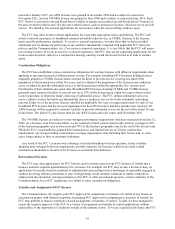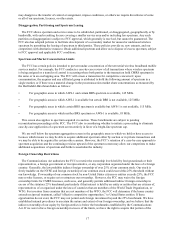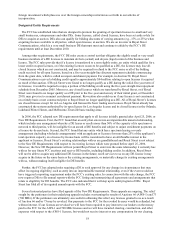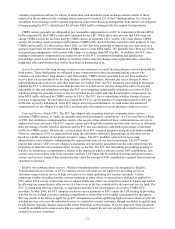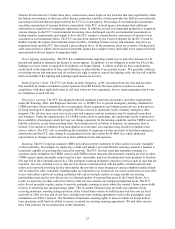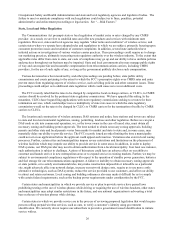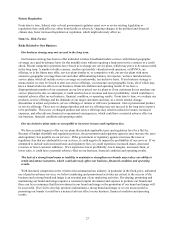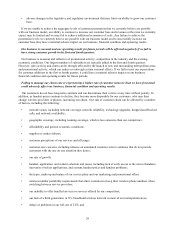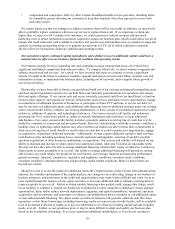Metro PCS 2009 Annual Report Download - page 33
Download and view the complete annual report
Please find page 33 of the 2009 Metro PCS annual report below. You can navigate through the pages in the report by either clicking on the pages listed below, or by using the keyword search tool below to find specific information within the annual report.21
voluntary negotiation and may be subject to arbitration with incumbent local exchange carriers similar to those
imposed on the incumbent local exchange carriers pursuant to Section 252 of the Communications Act. Once an
incumbent local exchange carrier requests negotiation of an interconnection arrangement, both carriers are obligated
to begin paying the FCC’s default rates for all intra-MTA traffic exchanged after the request for negotiation.
CMRS carriers generally are obligated to pay reasonable compensation to a LEC in connection with intra-MTA
traffic originated by the CMRS carrier and terminated by the LEC. While these rules provide that LECs may not
charge CMRS carriers for facilities used by CMRS carriers to terminate LECs’ traffic, LECs may charge CMRS
carriers for facilities used to transport and terminate CMRS traffic and for facilities used for transit purposes to carry
CMRS carrier traffic to a third carrier. Since 2005, no LEC has been permitted to impose rates by state tariff on a
going-forward basis for the termination of a CMRS carrier’s intra-MTA traffic. We generally have been successful
in negotiating arrangements with carriers with whom we exchange intra-MTA traffic. In addition, the FCC rules
relating to intercarrier compensation are under review by the FCC in various rulemaking and adjudicatory
proceedings, and it is not known whether or not there will be material changes in the applicable rules, when they
might take effect and whether they will be beneficial or detrimental to us.
Access. In order to offer long distance services to our customers, we resell the long distance services provided by
third parties. Those third parties are obligated to pay compensation to the telecommunications carriers who
terminate our subscribers’ long distance calls. Historically, CMRS carriers generally have not been entitled to
receive direct access payments for the long distance calls they terminate, but must pay access charges to other
telecommunications carriers for calls they terminate. In October 2007, the FCC initiated a proceeding to determine
whether the FCC’s current rules ensure that the rates for switched access services charged by LECs are just and
reasonable. In this and related proceedings, the FCC is investigating certain traffic stimulation activities of LECs
which are alleged to generate excessive fees for switched access traffic and which could affect compensation for
intra-MTA traffic delivered by CMRS carriers to LECs. The FCC also is considering whether sharing of access
revenues is appropriate. We and others have asked the FCC to cap the amount of compensation paid to LECs for
traffic that is grossly imbalanced. If the FCC adopts such proposed limitations, it could reduce the amount of
compensation we are obligated to pay LECs, and may affect the amount of access sharing revenue we receive.
Universal Service Fund (USF). The FCC has adopted rules requiring interstate communications carriers,
including CMRS carriers, to “make an equitable and non-discriminatory contribution” to a Universal Service Fund,
or USF, that reimburses communications carriers who are providing subsidized basic communications services to
underserved areas and users. The FCC requires carriers providing both intrastate and interstate services to determine
their percentage of traffic which is interstate and the FCC has also adopted a safe-harbor percentage of interstate
traffic for CMRS carriers. Historically, we have made these FCC-required payments using the safe-harbor method.
However, starting in 2010, we migrated from using the safe harbor method to determining our interstate service
based on a traffic analysis of our actual customer’s usage. The FCC prohibits carriers from recovering
administrative costs related to administering the required universal service fund assessments. The FCC’s rules
require that carriers’ USF recovery charges to customers not exceed the assessment rate the carrier pays times the
proportion of interstate telecommunications revenue on the bill. The FCC has rulemaking proceedings pending in
which it is considering a comprehensive reform of the manner in which it assesses carrier USF contributions, how
carriers may recover their costs from customers and how USF funds will be distributed among and between states,
carriers and services. Some of these proposals may cause the amount of USF contributions required from us and our
customers to increase.
Eligible telecommunications carriers. Wireless broadband mobile carriers may be designated as Eligible
Telecommunications Carriers, or ETCs, and may receive universal service support for providing service to
customers using wireless service in high cost areas or to certain qualifying low income customers. Certain
competing wireless broadband mobile carriers operating in states where we operate have obtained or applied for
ETC status. Their receipt of universal service support funds may affect our competitive status in a particular market
by allowing our competitors to offer service at a lower rate or for free, subsidized by the universal service fund. The
FCC is considering altering, reducing, or capping the amount of universal support received by CMRS ETC
providers. In May 2008, the FCC adopted an interim cap on payments to ETCs under the USF relating to providing
wireless service in high cost areas, pending comprehensive reform that is now under consideration by the agency.
We may decide in the future to apply for an ETC designation in certain qualifying high cost areas where we provide
wireless services or to provide subsidized service to certain low income customers, though our ability to qualify may
be affected by ongoing changes and possible future limitations in the program. If we are approved, these payments
would be an additional revenue source that we could use to support the services we provide in high cost areas or to
certain low income customers.







